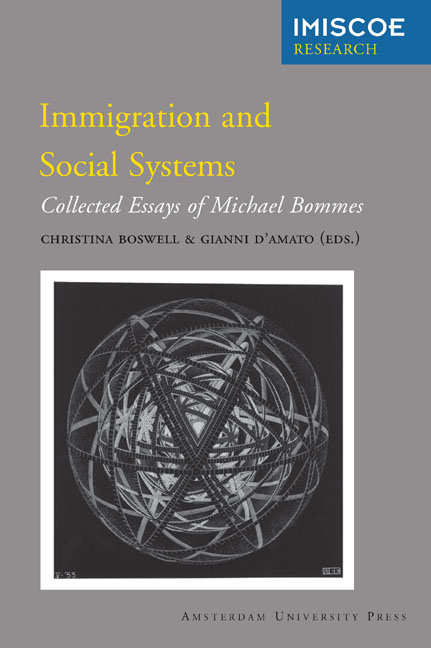Book contents
- Frontmatter
- Contents
- Foreword
- Preface
- Introduction
- 1 Migration in Modern Society
- 2 National Welfare State, Biography and Migration: Labour Migrants, Ethnic Germans and the Re-Ascription Of Welfare State Membership
- 3 Systems Theory and the ‘Ethnic Inequality’ of Migrant Workers
- 4 Welfare Systems and Migrant Minorities: The Cultural Dimension of Social Policies and its Discriminatory Potential
- 5 Transnationalism or Assimilation?
- 6 ‘Integration takes Place Locally’: On the Restructuring of Local Integration Policy
- 7 Illegal Migration in Modern Society: Consequences and Problems of National European Migration Policies
- 8 General and Specific Characteristics of Networks: (with Veronika Tacke)
- 9 National Paradigms of Migration Research: (with Dietrich Thränhardt)
- References
- Other IMISCOE Titles
6 - ‘Integration takes Place Locally’: On the Restructuring of Local Integration Policy
Published online by Cambridge University Press: 09 January 2021
- Frontmatter
- Contents
- Foreword
- Preface
- Introduction
- 1 Migration in Modern Society
- 2 National Welfare State, Biography and Migration: Labour Migrants, Ethnic Germans and the Re-Ascription Of Welfare State Membership
- 3 Systems Theory and the ‘Ethnic Inequality’ of Migrant Workers
- 4 Welfare Systems and Migrant Minorities: The Cultural Dimension of Social Policies and its Discriminatory Potential
- 5 Transnationalism or Assimilation?
- 6 ‘Integration takes Place Locally’: On the Restructuring of Local Integration Policy
- 7 Illegal Migration in Modern Society: Consequences and Problems of National European Migration Policies
- 8 General and Specific Characteristics of Networks: (with Veronika Tacke)
- 9 National Paradigms of Migration Research: (with Dietrich Thränhardt)
- References
- Other IMISCOE Titles
Summary
‘Integration takes place locally’: this motto accompanies a multitude of events which for some time now have been organised in cities, municipalities and rural districts in Germany for dealing publicly with the subject of migration and integration. A great many of these events are associated with public commitments to integration. Perhaps in the past the subject has been given too little attention and not been treated systematically enough. Or perhaps this has in fact always been done, but in the future it needs to be done even more intensively and systematically. There is, accordingly, a need for directing all responsible authorities in the local community towards this end, while gaining greater support among local citizens for this subject. ‘In the future it will also be the municipalities that will have to provide the bulk of integration support services.’ In this connection, local integration plans or concepts are being newly drafted or rewritten, options for the longer-term monitoring of integration are being examined and appropriate initiatives are being subsumed under the motto of intercultural openness, of integration management and diversity management.
The present text examines the question of what has set in motion this realignment of municipalities and led them to make integration policy a central concern of their local policy. In the first section we discuss various suggestions for explaining this. In a second step we recommend embedding this realignment in the changes being made in the integration policy of the German federal welfare state, changes that result from the political realisation that migrants have become the normal clientele of political administration and that migration has become a normal structural feature of the population. In the third step we argue – against this backdrop – that municipalities have been pushed to this new integration policy in recent years through political mobilisation from within and without, and we consider their various efforts toward realignment to be attempts to lend their integration policy a legitimate, publicly recognised institutional form by aligning it to relevant models. In the conclusion we address the issue of the consequences of the analysis for the evaluation of future local integration policy.
- Type
- Chapter
- Information
- Immigration and Social SystemsCollected Essays of Michael Bommes, pp. 125 - 156Publisher: Amsterdam University PressPrint publication year: 2013



